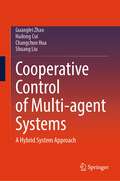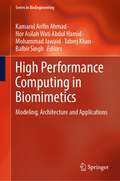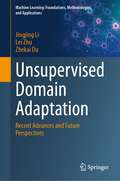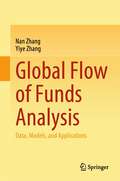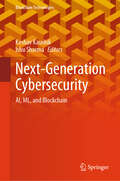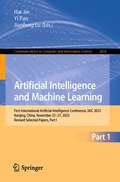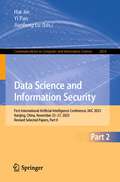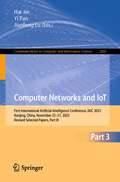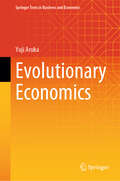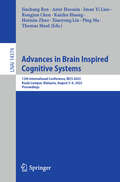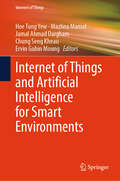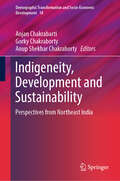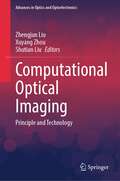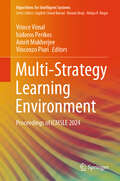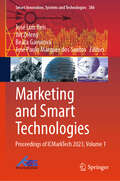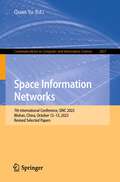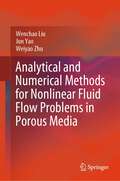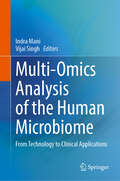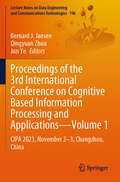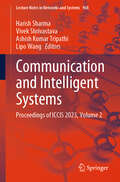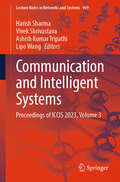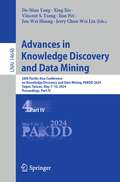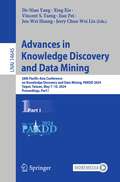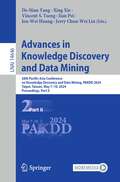- Table View
- List View
Cooperative Control of Multi-agent Systems: A Hybrid System Approach
by Guanglei Zhao Hailong Cui Changchun Hua Shuang LiuThis book focuses on stability analysis and control design approaches for multi-agent systems under network-induced constraints. A hybrid system approach is introduced to address the cooperative control problem of networked multi-agent systems, and several important topics such as asynchronous sampled data cooperative control, hybrid event-triggered cooperative control, and reset-based cooperative control are studied under the hybrid system framework. The special feature of this book is that a hybrid systems approach is proposed for the cooperative control of multi-agent systems, which is beneficial for relaxing the conservativeness of stability analysis and network parameter computation. Interested readers can learn a novel approach to cooperative control of multi-agent systems, and this book can benefit researchers, engineers, and graduate students in the fields of multi-robot cooperation, unmanned aerial vehicle formation, control engineering, etc.
High Performance Computing in Biomimetics: Modeling, Architecture and Applications (Series in BioEngineering)
by Kamarul Arifin Ahmad Nor Asilah Wati Abdul Hamid Mohammad Jawaid Tabrej Khan Balbir SinghThis book gives a complete overview of current developments in the implementation of high performance computing (HPC) in various biomimetic technologies. The book presents various topics that are subdivided into the following parts: A) biomimetic models and mechanics; B) locomotion and computational methods; C) distributed computing and its evolution; D) distributed and parallel computing architecture; E) high performance computing and biomimetics; F) big data, management, and visualization; and G) future of high performance computing in biomimetics. This book presents diverse computational technologies to model and replicate biologically inspired design for the purpose of solving complex human problems. The content of this book is presented in a simple and lucid style which can also be used by professionals, non-professionals, scientists, and students who are interested in the research area of high performance computing applications in the development of biomimetics technologies.
Unsupervised Domain Adaptation: Recent Advances and Future Perspectives (Machine Learning: Foundations, Methodologies, and Applications)
by Jingjing Li Lei Zhu Zhekai DuUnsupervised domain adaptation (UDA) is a challenging problem in machine learning where the model is trained on a source domain with labeled data and tested on a target domain with unlabeled data. In recent years, UDA has received significant attention from the research community due to its applicability in various real-world scenarios. This book provides a comprehensive review of state-of-the-art UDA methods and explores new variants of UDA that have the potential to advance the field. The book begins with a clear introduction to the UDA problem and is mainly organized into four technical sections, each focused on a specific piece of UDA research. The first section covers criterion optimization-based UDA, which aims to learn domain-invariant representations by minimizing the discrepancy between source and target domains. The second section discusses bi-classifier adversarial learning-based UDA, which creatively leverages adversarial learning by conducting a minimax game between the feature extractor and two task classifiers. The third section introduces source-free UDA, a novel UDA setting that does not require any raw data from the source domain. The fourth section presents active learning for UDA, which combines domain adaptation and active learning to reduce the amount of labeled data needed for adaptation. This book is suitable for researchers, graduate students, and practitioners who are interested in UDA and its applications in various fields, primarily in computer vision. The chapters are authored by leading experts in the field and provide a comprehensive and in-depth analysis of the current UDA methods and new directions for future research. With its broad coverage and cutting-edge research, this book is a valuable resource for anyone looking to advance their knowledge of UDA.
Global Flow of Funds Analysis: Data, Models, and Applications
by Nan Zhang Yiye ZhangThis book is the first to focus on the global flow of funds (GFF), providing an introduction to its fundamental concepts and establishing a theoretical framework for analysis. It connects the flow of funds within domestic economies to that of the rest of the world, offering a comprehensive analysis of GFF dynamics. This study enhances GFF statistics, enabling the assessment of global financial stability from both national and cross-border sectoral perspectives. The GFF data provide valuable insights into analyzing interconnectivity across borders and an understanding of global financial interdependencies. By examining the data sources and reconstructing the statistical framework to establish the GFF statistical matrix, this book conducts a case study to evaluate financial risks and influences in G20 countries. Subsequently, it connects the GFF matrix with sectoral account data and the flow of funds to establish the sectoral from-whom-to-whom financial stock matrix (SFSM). The SFSM aims to establish a new framework for conducting multi-country, multi-sector analysis within the G20, with a special emphasis on examining the national and cross-border exposures of sectors in China, Japan, and the USA. This involves constructing country-specific financial networks and connecting them based on cross-border exposures. The systematic analysis results effectively showcase the financial interconnections among G20 countries within the GFF and shed light on the attributes of external shocks and internal influences. The focus is particularly on the changes in risk exposure between China and the USA concerning their external assets and liabilities and the implications of economic decoupling of these dynamics.
Next-Generation Cybersecurity: AI, ML, and Blockchain (Blockchain Technologies)
by Keshav Kaushik Ishu SharmaThis book highlights a comprehensive overview of the recent advancements and challenges in the field of cybersecurity with a focus on the integration of artificial intelligence (AI), machine learning (ML), and blockchain technologies. The book targets both researchers and practitioners working in the field of cybersecurity and aims to fill the gap in the current literature by providing a comprehensive and up-to-date examination of the integration of AI, ML, and blockchain in cybersecurity systems. The book has a technical focus and provides an in-depthexamination of the latest developments in the field. It covers a range of topics including the basics of AI, ML, and blockchain, the application of AI and ML in cybersecurity, the use of blockchain in cybersecurity, and the integrationof AI, ML, and blockchain in cybersecurity systems. Each chapter is written by leading experts in the field and provides a thorough and technical overview of the topic, including case studies, examples, and practical applications.
Artificial Intelligence and Machine Learning: First International Artificial Intelligence Conference, IAIC 2023, Nanjing, China, November 25–27, 2023, Revised Selected Papers, Part I (Communications in Computer and Information Science #2058)
by Hai Jin Yi Pan Jianfeng LuThis 3-volume set, CCIS 2058-2060 constitutes the First International Conference, on Artificial Intelligence, IAIC 2023, held in Nanjing, China, in November 2023. The 85 full papers presented were carefully reviewed and selected from 428 submissions. The papers are clustered in parts on: Artificial Intelligence and Machine Learning; Data Security and information Security; Computer Networks and IoT. The papers present recent research and developments in artificial intelligence and its applications in machine learning, natural language processing, computer vision, robotics, and ethical considerations.
Data Science and Information Security: First International Artificial Intelligence Conference, IAIC 2023, Nanjing, China, November 25–27, 2023, Revised Selected Papers, Part II (Communications in Computer and Information Science #2059)
by Hai Jin Yi Pan Jianfeng LuThis 3-volume set, CCIS 2058-2060 constitutes the First International Conference, on Artificial Intelligence, IAIC 2023, held in Nanjing, China, in November 2023. The 85 full papers presented were carefully reviewed and selected from 428 submissions. The papers are clustered in parts on: Artificial Intelligence and Machine Learning; Data Security and information Security; Computer Networks and IoT. The papers present recent research and developments in artificial intelligence and its applications in machine learning, natural language processing, computer vision, robotics, and ethical considerations.
Computer Networks and IoT: First International Artificial Intelligence Conference, IAIC 2023, Nanjing, China, November 25–27, 2023, Revised Selected Papers, Part III (Communications in Computer and Information Science #2060)
by Hai Jin Yi Pan Jianfeng LuThis 3-volume set, CCIS 2058-2060 constitutes the First International Conference, on Artificial Intelligence, IAIC 2023, held in Nanjing, China, in November 2023. The 85 full papers presented were carefully reviewed and selected from 428 submissions. The papers are clustered in parts on: Artificial Intelligence and Machine Learning; Data Security and information Security; Computer Networks and IoT. The papers present recent research and developments in artificial intelligence and its applications in machine learning, natural language processing, computer vision, robotics, and ethical considerations.
Evolutionary Economics (Springer Texts in Business and Economics)
by Yuji ArukaThis textbook presents a new way to visualize or imagine the evolutionary architecture of economics, to judge both its practical outcomes and its ultimate value. Evolutionary economics employs an Aristotelian architecture. The cognitive value of this imagination[H1] must be directly relevant to the evolutionary theory and practice of designing the architecture of the economic system. Mainstream economics completely ignores design value in order to concentrate on the ideal, Platonic vision of the economy. The current system is no longer one that converges on a constant entity, because the system is constantly evolving. The advent of the digital economy is an indispensable next step, and computational power and algorithmic rationality are increasingly dominating the economic system—and complicating it. In today’s society, neither fault nor malice matters in the algorithmic or human system. There is little room left for the effective working of human reason. Correspondingly, the meanings of money, exchange, the market system, auctions, production, consumption, and the currency transaction system are poised to change. In most cases, there will be digital counterparts. A smart contract tied together with DLT, for example, makes it possible to design an economically well-behaved peer-to-peer (P2P) system, which ranges from the micromarket to the international currency transaction system. The introduction of this technology and its architectural design may suggest what a truly decentralized future entails. This change may also bring about a new understanding of existing social consensus and practice. Thus, the implementation of these considerations naturally leads to a new style of chapter structuring in this book, from the classical analytical approach to exploring computational methods and digital tools: in many cases, the problems presented in each chapter are combined with discussions of a respective computational method and its practical value.
Advances in Brain Inspired Cognitive Systems: 13th International Conference, BICS 2023, Kuala Lumpur, Malaysia, August 5–6, 2023, Proceedings (Lecture Notes in Computer Science #14374)
by Jinchang Ren Amir Hussain Iman Yi Liao Rongjun Chen Kaizhu Huang Huimin Zhao Xiaoyong Liu Ping Ma Thomas MaulThis book constitutes the refereed proceedings of the International Conference on Brain Inspired Cognitive Systems, BICS 2023, held in Kuala Lumpur, Malaysia, in August 2023. The 36 full papers included in this book were reviewed and selected from 58 submissions and are organized in thematic sections as follows: Bio-inspired systems and Neural Computation; Image Recognition, Detection and Classification; Vision and Object Tracking; Data Analysis and Machine Learning and Applications.
Internet of Things and Artificial Intelligence for Smart Environments (Internet of Things)
by Hoe Tung Yew Mazlina Mamat Jamal Ahmad Dargham Chung Seng Kheau Ervin Gubin MoungThis book highlights the application of smart technologies that utilize the Internet of Things (IoT) and Artificial Intelligence (AI) to enhance efficiency and productivity across various industries. It provides a comprehensive review of the latest IoT and AI developments, including their applications, opportunities, and challenges in smart environments. This book is a valuable resource for researchers, engineers, academics, and students working on implementing smart technologies.
Indigeneity, Development and Sustainability: Perspectives from Northeast India (Demographic Transformation and Socio-Economic Development #18)
by Anjan Chakrabarti Gorky Chakraborty Anup Shekhar ChakrabortyThis volume presents cutting-edge research on India's Northeast region relating to borders, material mobilities, contested identities, and economic and political dynamics. It offers a comprehensive understanding of the developmental challenges currently faced by Northeast India, including the complexities of the labor market and the neoliberal economy. The book highlights the lived experiences of individuals in varied geographies and perspectives. It is organized into five sections, each addressing the region's old and vexed questions of 'development', and its complicated relationship with indigeneity and sustainability. Contributions from scholars of various disciplines provide an all-inclusive picture of the region, ranging from a macro to a micro level. Interdisciplinary in nature, the book interests a cross-section of academics and graduate students from different disciplines, including sociology, social anthropology, economics, political science, human geography, history, public policy, and development studies.
Computational Optical Imaging: Principle and Technology (Advances in Optics and Optoelectronics)
by Zhengjun Liu Xuyang Zhou Shutian LiuThis book highlights a comprehensive introduction to the principles and calculation methods of computational optical imaging. Integrating optical imaging and computing technology to achieve significant performance improvements, computational optical imaging has become an active research field in optics. It has given rise to the emerging of new concepts such as computational imaging, computational measurement and computational photography. As high-performance image detectors make image measurements discrete and digital, images are mostly recorded in the form of discrete data, almost replacing the continuous medium used for pattern recording. Computational optical imaging technology has become an effective way for people to study microscopic imaging. At present, different imaging systems are composed of continuous optical elements such as lenses and prisms or discrete optical elements such as spatial light modulators or digital micro-mirror devices. The current computing technology has permeated all aspects of imaging systems and gradually promotes the digitization of optical imaging systems. This book summarizes the representative work done in this field and introduces the latest results. Computing technology plays an important bridging role between theories of optics and experimental systems, which inspires more comprehensive and in-depth research. It has the advantages of high repeatability, flexibility, strong computing power and low cost. In this multidisciplinary field, researchers in computer science, optics and information science have joined together to extend its depth and breadth. Targeting cutting-edge issues to be solved in computational optics, this book introduces a variety of methods that involve theoretical innovations and technical breakthroughs in imaging resolution, the field of view, imaging speed, and computing speed. It intends to provide a handy reference and technical support for graduate students, researchers and professionals engaged in the study and practice of computational optical imaging.
Multi-Strategy Learning Environment: Proceedings of ICMSLE 2024 (Algorithms for Intelligent Systems)
by Vincenzo Piuri Isidoros Perikos Vrince Vimal Amrit MukherjeeThe book presents selected papers from International Conference on Multi-Strategy Learning Environment (ICMSLE 2024), held at Graphic Era Hill University, Dehradun, India, during 12–13 January 2024. This book presents current research in machine learning techniques, deep learning theories and practices, interpretability and explainability of AI algorithms, game theory and learning, multi-strategy learning (MSL) in distributed and streaming environments, and adaptive data analysis and selective inference.
Marketing and Smart Technologies: Proceedings of ICMarkTech 2023, Volume 1 (Smart Innovation, Systems and Technologies #386)
by José Luís Reis José Paulo Marques dos Santos Jiří Zelený Beáta GavurováThis book includes selected papers presented at the International Conference on Marketing and Technologies (ICMarkTech 2023), held at Faculty of Economics and Management (FEM), Czech University of Life Sciences Prague (CZU), in partnership with University College Prague (UCP), in Prague, Czech Republic, between 30 November and 2 December 2023. It covers up-to-date cutting-edge research on artificial intelligence applied in marketing, virtual and augmented reality in marketing, business intelligence databases and marketing, data mining and big data, marketing data science, web marketing, e-commerce and v-commerce, social media and networking, geomarketing and IoT, marketing automation and inbound marketing, machine learning applied to marketing, customer data management and CRM, and neuromarketing technologies.
Space Information Networks: 7th International Conference, SINC 2023, Wuhan, China, October 12–13, 2023, Revised Selected Papers (Communications in Computer and Information Science #2057)
by Quan YuThis book constitutes revised selected papers from the thoroughly refereed proceedings of the 7th International Conference on Space Information Network, SINC 2023, held in Wuhan, China, during October 12–13, 2023. The 8 full papers and 5 short papers included in this book were carefully reviewed and selected from 73 submissions. The papers present the latest research in the fields of space information networks.
Gifts to the Sad Country: Essays on the Chinese Diaspora
by Souchou YaoThis book is a study of an ethnic-Chinese family in Malaysia as it struggled with the upheavals in China during the Land Reform (1945-1953) and the Great Leap Forward (1958-1962). Based on fieldwork in Malaysia and in a village in Dabu County, Southern China, it tells a story of a family whose existence straddled two nations, two political systems. Emigration is shown to be both a positive experience and a source of despair. The study redefines the conventional narrative about the Chinese diaspora as economically driven and politically expedient; mobility, personal freedom and transnational journeying were a part of their cultural history. The book highlights the fact that Chinese homeland, even under communist rule, offered the people a means of identification under difficult circumstances. During the time of radical reform, the diaspora adapted themselves to the conditions in the homeland, and for some China remained a place of longing and emotional attachment.
Analytical and Numerical Methods for Nonlinear Fluid Flow Problems in Porous Media
by Wenchao Liu Jun Yao Weiyao ZhuThis book investigates in detail the mathematical methods and computation methods in efficient solution of some open nonlinear seepage flow problems involved in engineering problems. Developed engineering technologies and some relevant practical field applications are also provided. The introduced open nonlinear problems include nonlinear quadratic pressure gradient term problem, compressible gas seepage flow problem and low-velocity non-Darcy seepage flow problem. Studies on these nonlinear seepage flow problems have attracted engineers and scientists from various disciplines, such as geo-energy engineering, civil and environmental engineering, fluid mechanics, applied mathematics and computation. In particular, the book systematically establishes a fundamental theory for a strongly nonlinear problem of low-velocity non-Darcy seepage flow from a new perspective of moving boundary, while emphasizing the usage of mathematical linearization transformation methods and computational methods into the analytical and numerical solution of the strongly nonlinear partial differential equations. Sufficient knowledge of mathematics is always introduced ahead of model solution to assist readers. And the procedure of strict formula deduction in the model solution process is provided in detail. High-solution figures and tables from model solution are rich in the book. Therefore, it is very helpful for the readers to master the nonlinear model solution methods and engineering technologies. The book is intended for upper undergraduate students and graduate students who are interested in engineering technology, fluid mechanics and applied mathematics, researchers and engineers working on geo-energy science and engineering and field applications.
Multi-Omics Analysis of the Human Microbiome: From Technology to Clinical Applications
by Vijai Singh Indra ManiThis book introduces the rapidly evolving field of multi-omics in understanding the human microbiome. The book focuses on the technology used to generate multi-omics data, including advances in next-generation sequencing and other high-throughput methods. It also covers the application of artificial intelligence and machine learning algorithms to the analysis of multi-omics data, providing readers with an overview of the powerful computational tools that are driving innovation in this field. The chapter also explores the various bioinformatics databases and tools available for the analysis of multi-omics data. The book also delves into the application of multi-omics technology to the study of microbial diversity, including metagenomics, metatranscriptomics, and metaproteomics. The book also explores the use of these techniques to identify and characterize microbial communities in different environments, from the gut and oral microbiome to the skin microbiome and beyond. Towards theend, it focuses on the use of multi-omics in the study of microbial consortia, including mycology and the viral microbiome. The book also explores the potential of multi-omics to identify genes of biotechnological importance, providing readers with an understanding of the role that this technology could play in advancing biotech research. Finally, the book concludes with a discussion of the clinical applications of multi-omics technology, including its potential to identify disease biomarkers and develop personalized medicine approaches. Overall, this book provides readers with a comprehensive overview of this exciting field, highlighting the potential for multi-omics to transform our understanding of the microbial world.
Proceedings of the 3rd International Conference on Cognitive Based Information Processing and Applications–Volume 1: CIPA 2023, November 2–3, Changzhou, China (Lecture Notes on Data Engineering and Communications Technologies #196)
by Jun Ye Bernard J. Jansen Qingyuan ZhouThis book contains papers presented at the 3rd International Conference on Cognitive- based Information Processing and Applications (CIPA) in Changzhou, China, from November 2–3, 2023. The papers represent the various technological advancements in theory, technology and application of artificial intelligence, including precision mining, intelligent computing, deep learning, and all other theories, models, and technologies related to artificial intelligence. It caters to postgraduate students, researchers, and practitioners specializing and working in the area of cognitive-inspired computing and intelligent computing. The book represents Volume 1 for this conference proceedings, which consists of a 3-volume book series.
Communication and Intelligent Systems: Proceedings of ICCIS 2023, Volume 2 (Lecture Notes in Networks and Systems #968)
by Lipo Wang Harish Sharma Vivek Shrivastava Ashish Kumar TripathiThis book gathers selected research papers presented at the Fifth International Conference on Communication and Intelligent Systems (ICCIS 2023), organized by Malaviya National Institute of Technology Jaipur, India, during December 16–17, 2023. This book presents a collection of state-of-the-art research work involving cutting-edge technologies for communication and intelligent systems. Over the past few years, advances in artificial intelligence and machine learning have sparked new research efforts around the globe, which explore novel ways of developing intelligent systems and smart communication technologies. The book presents single- and multi-disciplinary research on these themes to make the latest results available in a single, readily accessible source. The work is presented in three volumes.
Communication and Intelligent Systems: Proceedings of ICCIS 2023, Volume 3 (Lecture Notes in Networks and Systems #969)
by Lipo Wang Harish Sharma Vivek Shrivastava Ashish Kumar TripathiThis book gathers selected research papers presented at the Fifth International Conference on Communication and Intelligent Systems (ICCIS 2023), organized by Malaviya National Institute of Technology Jaipur, India, during December 16–17, 2023. This book presents a collection of state-of-the-art research work involving cutting-edge technologies for communication and intelligent systems. Over the past few years, advances in artificial intelligence and machine learning have sparked new research efforts around the globe, which explore novel ways of developing intelligent systems and smart communication technologies. The book presents single- and multi-disciplinary research on these themes to make the latest results available in a single, readily accessible source. The work is presented in three volumes.
Advances in Knowledge Discovery and Data Mining: 28th Pacific-Asia Conference on Knowledge Discovery and Data Mining, PAKDD 2024, Taipei, Taiwan, May 7–10, 2024, Proceedings, Part IV (Lecture Notes in Computer Science #14648)
by Vincent S. Tseng Jerry Chun-Wei Lin Xing Xie Jian Pei De-Nian Yang Jen-Wei HuangThe 6-volume set LNAI 14645-14650 constitutes the proceedings of the 28th Pacific-Asia Conference on Knowledge Discovery and Data Mining, PAKDD 2024, which took place in Taipei, Taiwan, during May 7–10, 2024. The 177 papers presented in these proceedings were carefully reviewed and selected from 720 submissions. They deal with new ideas, original research results, and practical development experiences from all KDD related areas, including data mining, data warehousing, machine learning, artificial intelligence, databases, statistics, knowledge engineering, big data technologies, and foundations.
Advances in Knowledge Discovery and Data Mining: 28th Pacific-Asia Conference on Knowledge Discovery and Data Mining, PAKDD 2024, Taipei, Taiwan, May 7–10, 2024, Proceedings, Part I (Lecture Notes in Computer Science #14645)
by De-Nian Yang Xing Xie Vincent S. Tseng Jian Pei Jen-Wei Huang Jerry Chun-Wei LinThe 6-volume set LNAI 14645-14650 constitutes the proceedings of the 28th Pacific-Asia Conference on Knowledge Discovery and Data Mining, PAKDD 2024, which took place in Taipei, Taiwan, during May 7–10, 2024. The 177 papers presented in these proceedings were carefully reviewed and selected from 720 submissions. They deal with new ideas, original research results, and practical development experiences from all KDD related areas, including data mining, data warehousing, machine learning, artificial intelligence, databases, statistics, knowledge engineering, big data technologies, and foundations.
Advances in Knowledge Discovery and Data Mining: 28th Pacific-Asia Conference on Knowledge Discovery and Data Mining, PAKDD 2024, Taipei, Taiwan, May 7–10, 2024, Proceedings, Part II (Lecture Notes in Computer Science #14646)
by De-Nian Yang Xing Xie Vincent S. Tseng Jian Pei Jen-Wei Huang Jerry Chun-Wei LinThe 6-volume set LNAI 14645-14650 constitutes the proceedings of the 28th Pacific-Asia Conference on Knowledge Discovery and Data Mining, PAKDD 2024, which took place in Taipei, Taiwan, during May 7–10, 2024. The 177 papers presented in these proceedings were carefully reviewed and selected from 720 submissions. They deal with new ideas, original research results, and practical development experiences from all KDD related areas, including data mining, data warehousing, machine learning, artificial intelligence, databases, statistics, knowledge engineering, big data technologies, and foundations.
